Jordanian economist: Syrian refugees boon to Jordan
December 10, 2013 Jordan has felt the shockwaves of the […]
10 December 2013
December 10, 2013
Jordan has felt the shockwaves of the Syrian crisis as acutely as any other state in the region. The United Nations High Commissioner for Refugees currently estimates that Jordan, a country of some 7 million with few natural resources, has absorbed upwards of 560,000 Syrians since the start of Syria’s uprising in March 2011.
While international attention tends to focus on the Zaatari camp, which has become emblematic of the Syrian refugee crisis, most refugees have been absorbed into Jordanian communities. These Syrians are widely seen as a strain on Jordan’s fragile economy as they drive up housing prices, benefit from government subsidies and seek work, though they are not legally allowed to do so as refugees. Yet there are those who dispute the conventional wisdom that the Syrian crisis is undermining the Jordanian economy, arguing that Syrian refugees have brought businesses with them to Jordan, creating jobs and investment.
Dr. Yussef Mansour is an economist and columnist for the Jordan Times, and has written extensively on the impact of the Syrian crisis on the Jordanian economy. He spoke with Syria Direct’s Alex Simon to discuss his view that the Jordanian government has exaggerated the negative impacts of Syrian refugees on Jordan’s economy.
For a different point of view, see our interview from last week with Dr. Tayseer Smadi.
Q: What do you make of the widespread argument that Syrian refugees are undermining the Jordanian economy?
It’s really hard to justify the government’s argument here. Basically, they say that the refugees consume electricity and water, which is subsidized, and they compete for education and public schools. Consider that 72% of refugees do not place children in schools, and that because refugees live under harsher conditions they are less likely to consume the same amount of water and electricity. Every time we have refugees, Jordan tries to make the best out of it—we did that with the Iraqis before and we’re doing it with the Syrians.
I actually think the government has benefited from having the refugees. It’s basic economics; there’s something called the aggregate demand, which is the total demand in the economy. When the population increased by, say, 10 percent, as the government claims, then of course the aggregate demand should increase by something close to 10 percent, maybe 7, maybe 6. Which means people spend more, and it also means that the government makes more money from taxing expenditures. Because the refugees created a larger population, and because 1/3 of government revenues comes from the sales tax, the government benefited.
Q: And what about the claim that Syrians are taking jobs from Jordanians?
A: Only 5% of the Jordanian labor force goes to menial jobs. Jordanians like to go work for the government, or in white-collar jobs, but they don’t like to take up menial, manual labor. Most likely—and nobody has data on this—the Syrian refugees actually compete with the Egyptian workers. Refugees ask for lower salaries than Egyptians, and they don’t have a country to send their savings to, so they keep their money in Jordan, unlike the Egyptian workers. To claim that harm is being done to the government by the refugees is not true, especially because the government has received millions of dollars in aid.
Q: But clearly there are some strains created by the refugee presence—can you discuss those?
It happens that refugees are centered in areas such as Irbid and Mafraq where there is high poverty and unemployment. So they have created some jobs, but they also have created friction because some live better than Jordanian citizens. In many cases, refugee children in the camps are getting better schooling than Jordanians. This creates a lot of jealousy. But that’s not the fault of the refugees, it’s the fault of the Jordanian government, which is not providing proper services. That’s a deficit in Jordan—this is a government whose faults have been exposed by the refugee incidences.
If we want things to go well, given that the government in Jordan has an overstretched budget, and no money to spend in these areas, aid should go into these specific areas in order to ensure that there is no friction and no pressure among the host community and the refugees. Aid is needed both for refugees and for host communities.
Q: What do you think of the claim that Syrian business owners are primarily employing Syrians?
A: That may be partially true—they’re employing Syrians because the Syrians are better skilled than Jordanians, whose vocational training is very low. We came 102 out of 103 in terms of vocational training. So yes, maybe they’re hiring a majority of Syrians, but I don’t think that’s by design.
Photo courtesy of Al Arabiya.
Like Syria Direct on Facebook or follow us on Twitter.







